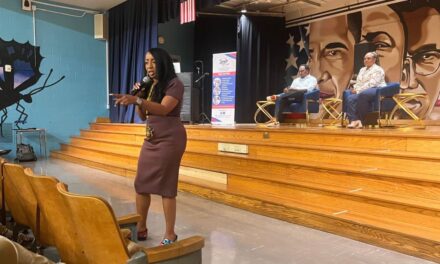By Imuetinyan Ugiagbe
Special to the AFRO
At the age of 34, James Mitchell embarked on his entrepreneurial journey in the information technology space, using the Langston Hughes Community, Business and Resource Center on Park Heights as his initial office space.
“In my family, there are not many people in tech, so it was hard to see that as an avenue.”
Mitchell said he struggled to get Reasonable Tech Solutions off the ground for five years.
“ I started to sit down and try to figure out how to really start a business. I didn’t have mentors or anybody to really give me the insight,” recounts Mitchell. “So I learned by reading books, I learned people and they would give me a little bit of insight, but really not the insight that I needed.”
Despite not having prior business knowledge, resources, funding or mentors, Mitchell exhibited remarkable resilience and an unwavering determination to succeed as an entrepreneur. After nearly 10 years, Mitchell established Innovative Initiatives, a non-profit foundation that focuses on providing free STEM education to youth, adults and seniors through the assistance of grants. The organization aims to inspire, empower and educate Park Heights residents.

According to the McKinsey Institute for Black Economic Mobility, within the United States workforce, Black people make up 12 percent of all workers but their representation in technology-related positions is limited to just 8 percent.
Mitchell’s goal is to bridge that gap while enhancing the Black lives of individuals who are underserved and underrepresented.
“Knowing that Black males and females from Baltimore are being certified in IT— a field where few people like us are—excites me. They can get higher paying jobs,” he says.
The Baltimore native was 14 years old when he began the practice of dismantling computers, starting with his mother’s machine. He openly confessed his difficulties in reassembling it, a predicament that not only resulted
in reprimands, but also ignited his fascination with the realm of computers.
Before launching Reasonable Tech Solutions, Mitchell held positions at Bethlehem Steel Railroad as a locomotive engineer conductor. He later worked for Comcast and then Verizon as a multimedia technician.
Mitchell started his entrepreneurial journey after losing his job at Verizon. His daughters were 10 and seven years old at that time. Despite the uncertainty, he was determined to take control of his financial future and pursue his love for coaching basketball.
Looking back on those initial days, he recalls, “I earned just $800 a month for almost two years. I was doing a lot of odd jobs: working for Amazon and mounting TVs. I really didn’t have the time to do it. I had to rob Peter to pay Paul. ”
Relocating from the Park Heights location to Towson, Md. marked a pivotal shift for Mitchell’s business, as it began to experience significant growth.
“I came over to first with my for-profit. It wasn’t a right fit because I was still trying to establish myself and my for-profit and I couldn’t do both. So I left about three or four years ago and I went to Towson, where I was able to kind of get a foothold,” he says.
“Now, I have a fully functional testing center, IT training center and managed service provider for many nonprofits across Baltimore and D.C.”
According to the RTS website, available services include help-desk security, system administration, computer repairs, data management and IT certification training.
Still, Mitchell kept hearing a call to help the community. The entrepreneur has been coaching basketball for 15 years and while coaching, he says he often meets young men in need of guidance.
In July of this year the Langston Hughes Community and Resource Center in Park Heights kicked off programming created by Mitchell, called Innovative Initiatives. Participants can enroll in training and take advantage of workforce development opportunities in the West Baltimore neighborhood of Park Heights.
“What sparked the nonprofit was kind of the caution side of me. I’ve always helped out. I’ve always looked out for guys who are from where I’ve been, which means non-traditional guys who don’t get the full ride to college, guys who are ‘in-between,’”said Mitchell. “They don’t know whether they can finish college or they don’t want to finish college, but they still need something to do,” he says.
“That kind of sparked me into youth because I was once that youth before. I’m from Baltimore. Speaking to them, you know, they understand me a little bit better than the typical person who hasn’t been from Baltimore or been from the city or been through that journey.”
Mitchell says that the organization’s program is two-fold: it will serve as a school for individuals 16 and older. But it also will target younger children to introduce them to IT – an opportunity that may not be available to them in their neighborhoods – and, hopefully, spark a sense of innovation and open up possibilities for their futures.
“You know, they watch the older generation and, unfortunately, they think that’s their destination,” he says. “I want some kids to know they don’t have to do that. They have other options. But again, kids don’t know other options unless they’re introduced to it. You know, most kids become a product of their environment.”
One of the courses will involve teaching children of varying age groups how to build a computer from scratch. “And after they get their computer built and functioning with our help, they’ll be able to take that home as well,” Mitchell adds.
Other courses include beginner coding, IT fundamentals, artificial intelligence computing and computer user security certifications. Last August, the serial entrepreneur began renovating certain rooms in the Langston Hughes building to prepare for the program this fall.
Mitchell credits his success thus far to his late father, who owned a VCR business; his mom, who owned a nursing agency business and his own efforts.
“If I had to say who inspires me the most it’s my dad, who died of cancer. He instilled perseverance and determination ,” Mitchell says of his father. “Watching him put everything into us and then not being able to see it…is heartbreaking for me. You know, because he did so much. He sacrificed so much for us and to me, I feel like he got the short end of the stick. You know, I feel like he should have been experiencing this right now.”
Datwone Gibson first crossed paths with Mitchell at a Lebron James tournament when he was just 13 years old. Now 22, Gibson is presently working as a tech operation specialist at T. Rowe Price, a global investment company. He attributes his success to the training he received through Innovative Initiatives.

Reflecting on his journey, Datwone emphasizes that, despite the promising and exciting future he now enjoys, his past was far from easy. As a young boy, Gibson faced challenges, including being evicted at the age of 8 and subsequent housing instability until he was 16. He also had some encounters with the law.
After completing high school in 2020, Gibson started his college journey at Albright College in Reading, Pa. However, financial constraints forced him to halt his education before he could finish.
“I truly did not know what to do,” Gibson recalls. “James kept talking about IT, sponsoring it, allowing people like myself to come take the class with no basic knowledge on it. I just had to jump on the opportunity.”
Deonte Stanley, a 21-year-old who grew up in Park Heights, got to know Mitchell through a close friend. He earned his IT certificates through a program funded by the Greater Baltimore Urban League, and he now works as a system analyst for an investment company. Stanley also is actively working toward earning his
associate degree from Community College of Baltimore County and obtaining additional IT certifications.

“In my family, there are not many people in tech, so it was hard to see that as an avenue,” he recalls.
Stanley credits his success thus far to his godfather, who is also in the IT profession, and James Mitchell. He emphasizes the significance of having a role model.
“It’s very important to have people who kind of set that vision for you. I believe the more you get to see it, you will believe it,” says Stanley. “That’s what my support group does. They back me 100 percent.”
The post IT entrepreneur aims to bridge Black tech gap one IT certification at a time appeared first on AFRO American Newspapers .











